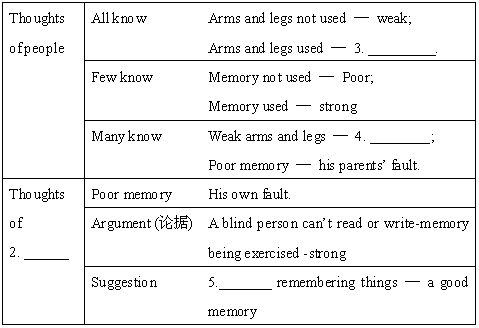
| 任务型阅读。请认真阅读下面短文,并根据所读内容在文章后表格中的空格里填入最恰当的单词。 注意:每空格1个单词。 | ||||||||||||||||||||
| Homework is a great way for kids to develop independent, lifelong learning skills, so here are some general homework tips for parents: ● Make sure your child has a quiet, well-lit place to do homework. Avoid having your child do homework with the television on or in places with other distractions, such as people coming and going. ● Make sure the materials your child needs, such as some paper, pencils and a dictionary, are available. Ask your child if special materials will be needed for some projects and get them in advance. ● Help your child with time management. Establish a set time each day for doing homework. Don't let your child leave homework until just before bedtime. Think about using a weekend morning or afternoon for working on big projects, especially if the project involves getting together with classmates. ● Be positive about homework. Tell your child how important school is. The attitude you express about homework will be the attitude your child acquires. ● When your child asks for help, provide guidance, not answers. Giving answers means your child will not learn the material. Too much help teaches your child that when the going gets rough, someone will do the work for him or her. Cooperation with the teacher. It shows your child that the school and home are a team. Follow the directions given by the teacher. ● Reward progress in homework. If your child has been successful in homework completion and is working hard, celebrate that success with a special even (e.g. pizza, a walk, a trip to the park) to reinforce the positive effort. | ||||||||||||||||||||
Title: (1) ____________ for parents on their children's homework
|
 阅读快车系列答案
阅读快车系列答案科目:高中英语 来源:0123 月考题 题型:阅读理解
查看答案和解析>>
科目:高中英语 来源:0112 期中题 题型:阅读理解

查看答案和解析>>
科目:高中英语 来源:0110 期中题 题型:完形填空
| 完形填空。 | ||||
| I found a new job in a school last year. When I entered the school, I was really 1. ______. Before I arrived, I thought the school would be 2. ______ and all the students would be having class in the classroom. 3. ______ all that I saw were the students 4. ______ on the playground. Some were playing with the sand and some were 5. ______ wooden toys. "What are you doing?" I asked a ten-year-old boy. "We are playing," he replied without 6. ______. I was confused. How could all the students be playing outside 7. ______ studying in the classroom? And none of them 8. ______ to care about their studies. Aren't they worried about their studies at all? What about the teachers? Do they 9. ______ them to play? With the 10. ______ in my mind, I went to the head teacher's 11. ______. "The students are allowed to play for ten days. In these ten days, they don't have to study in the classroom. What they need to do is to do what they like," said the head teacher. "But 12. ______?" I asked. "There was once a very good student in our school. He was very good at his 13. ______. But he never played. He studied all the time. However, he 14. ______became ill and was sent to the 15. ______ and died only four days later. Before he died, we 16. ______him what he wanted to do 17. ______. He said he wanted to play. So we 18. ______ to let the students play for ten days every 19. ______," said the teacher, and I finally knew why. That student's death gave the other students the 20. ______ to play. | ||||
|
查看答案和解析>>
科目:高中英语 来源:北京期中题 题型:阅读理解
查看答案和解析>>
科目:高中英语 来源:河北省期末题 题型:阅读理解
查看答案和解析>>
科目:高中英语 来源:0117 期中题 题型:阅读理解
查看答案和解析>>
科目:高中英语 来源:江西省同步题 题型:阅读理解
查看答案和解析>>
科目:高中英语 来源:福建省月考题 题型:阅读理解
查看答案和解析>>
湖北省互联网违法和不良信息举报平台 | 网上有害信息举报专区 | 电信诈骗举报专区 | 涉历史虚无主义有害信息举报专区 | 涉企侵权举报专区
违法和不良信息举报电话:027-86699610 举报邮箱:58377363@163.com